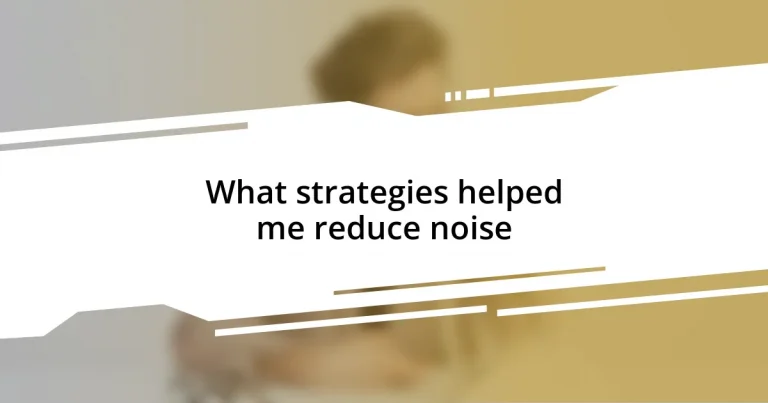Key takeaways:
- Noise negatively affects wellbeing, concentration, and mental health, leading to stress and sleep disturbances.
- Effective soundproofing techniques include using soundproof curtains, acoustic panels, door sweeps, rugs, and sealing gaps.
- Noise-canceling technology, including headphones and apps, can significantly improve focus and relaxation by reducing ambient distractions.
- Establishing quiet time routines, such as morning silence or afternoon breaks, enhances mental clarity and preserves inner peace.
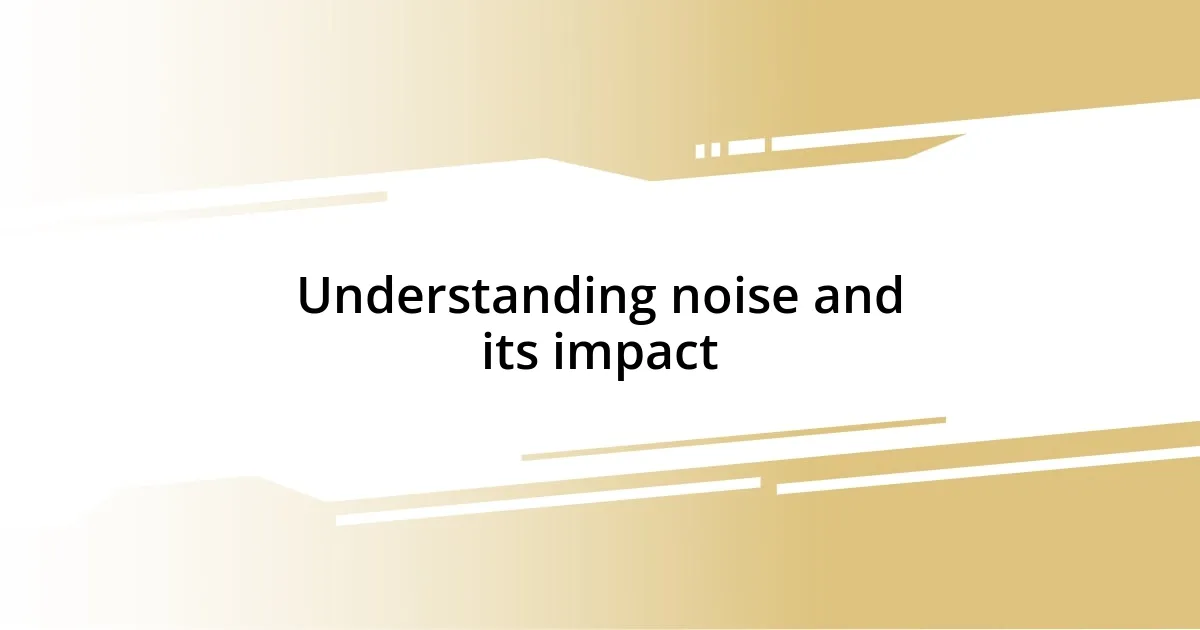
Understanding noise and its impact
Noise isn’t just an annoyance; it has tangible effects on our wellbeing. I remember working in an open office where the constant hum of chatter made it hard to concentrate. Have you ever felt that rush of frustration when distractions pull you away from your task? That chaotic environment can elevate stress levels, impacting both productivity and mental health.
When I lived in a busy city, the sounds of honking and construction often kept me awake at night. The impact of that relentless noise seeped into my daily life, exhausting me before I even started my day. It’s interesting to think about how often we overlook the influence of our environment. Could you find a quieter nook that enhances your focus and calmness?
Research shows that prolonged exposure to noise can lead to serious health issues, like anxiety and sleep disturbances. I once tried incorporating soundproofing elements in my home, and the difference was night and day. Have you ever experienced a moment of peace, abruptly interrupted by a loud sound? That harmony can be incredibly soothing, drastically improving how we feel overall.
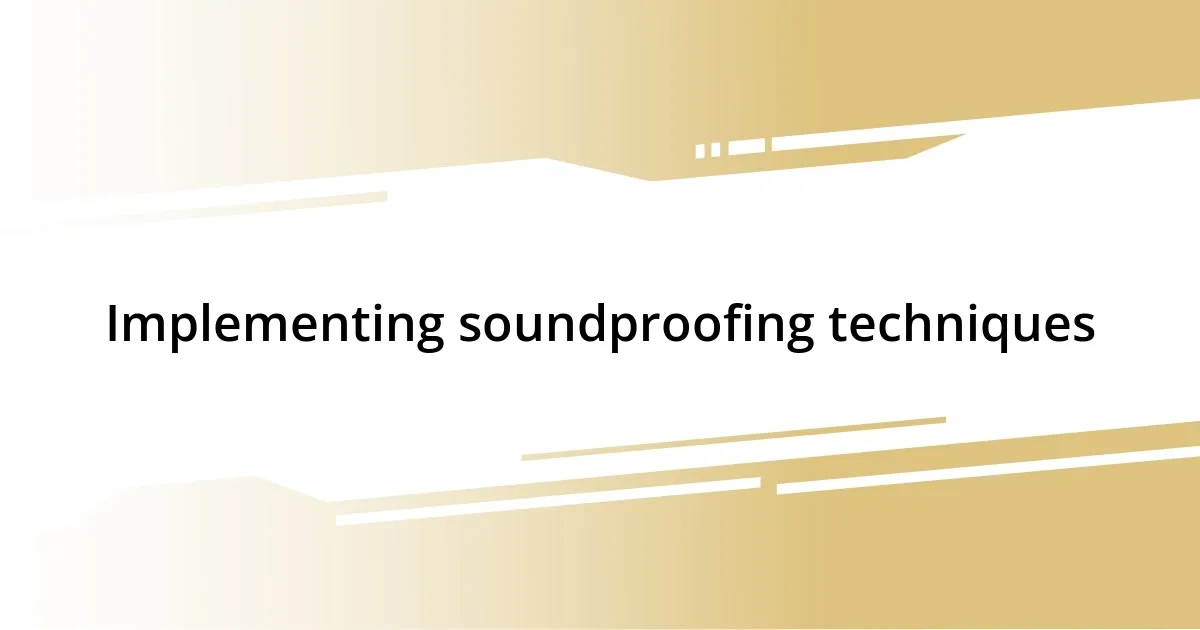
Implementing soundproofing techniques
Finding the right soundproofing techniques was a journey that required some trial and error. I started by focusing on areas where sound seemed to seep in the most, like the windows and doors. It was surprising how much difference simple adjustments made, like adding weather stripping to those drafty doors or investing in heavier curtains. These small changes not only helped muffle the outside noises, but they also created a snugger atmosphere in my home that felt more comforting.
Here are some soundproofing techniques I found particularly effective:
- Soundproof curtains: Thick, layered curtains can significantly absorb sound while adding style to your space.
- Acoustic panels: Installing these on walls can reduce echoes and dampen noise.
- Door sweeps: These can block sound from entering below the door and are simple to install.
- Rugs and carpets: Adding softness to floors can limit noise reflection and create a cozier feel.
- Sealing gaps: Using caulk or foam to fill cracks can make a big difference in sound transmission.
Every time I made these changes, I felt an immediate drop in stress levels. It brought back a tranquility I didn’t realize I was missing. Isn’t it amazing how a few adjustments can create a more peaceful environment?
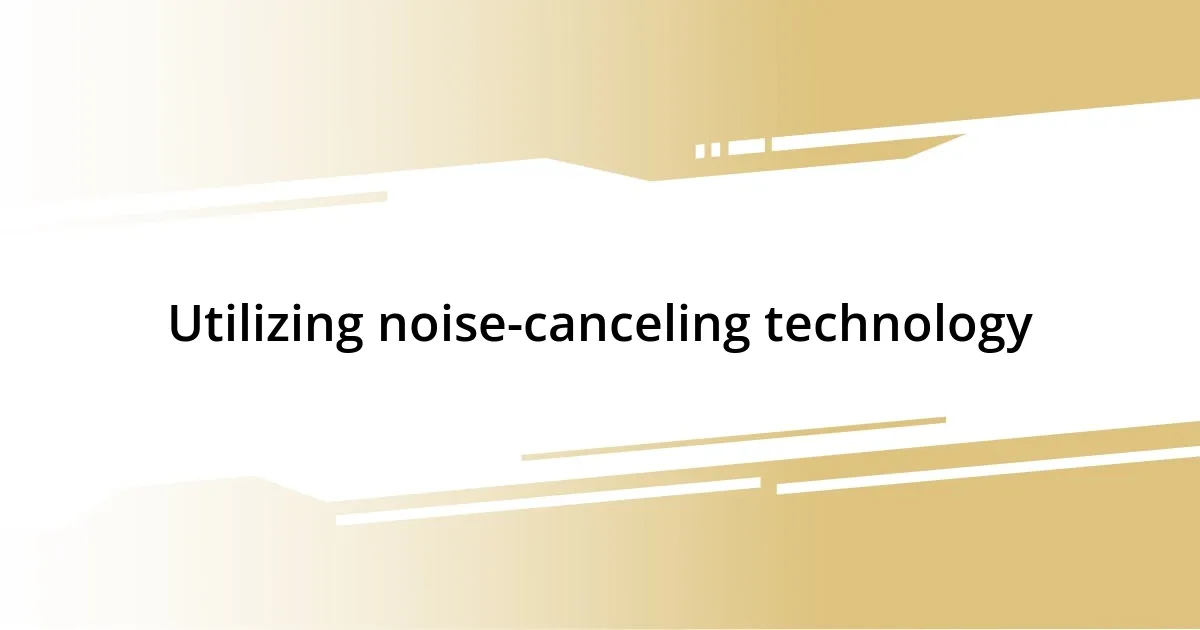
Utilizing noise-canceling technology
Utilizing noise-canceling technology has been a game changer for me. The first time I slipped on a pair of noise-canceling headphones, I was amazed at how much quieter the world around me became. It instantly transformed my work environment, allowing me to dive deep into tasks without interruptions. Have you ever noticed how much louder distractions can feel when you’re trying to focus? Noise-canceling technology works by using microphones that pick up ambient sounds and generate sound waves to cancel them out—this technique, known as active noise cancellation, has helped me reclaim my peace.
I also explored noise-canceling apps for my phone that create soothing sounds, like rainfall or white noise, which I found surprisingly effective, especially at bedtime. This combination of headphones and apps provided a double layer of refuge against unwelcome sounds. I recall using these tools during a long flight, turning the whir of the engines into a gentle backdrop, making the journey feel less tedious. It’s incredible how technology can create a personal sanctuary wherever you are, don’t you think?
Another aspect that really stood out to me was the variety in noise-canceling devices available today. From minimalist in-ear options to over-ear models that envelop you in sound, the choices are vast. Not only do they cater to personal preferences in design and comfort, but they also enhance the experience of listening to music or podcasts. I often find myself lost in a favorite playlist while the surrounding noise fades into oblivion. It’s moments like these that demonstrate the profound impact noise-canceling technology can have on our daily lives.
| Type | Features |
|---|---|
| Over-ear headphones | Provide maximum noise cancellation, comfortable for long wear |
| In-ear headphones | Compact, portable, good for travel but may offer less noise cancellation |
| Noise-canceling apps | Generate calming background sounds; great for relaxation and sleep |
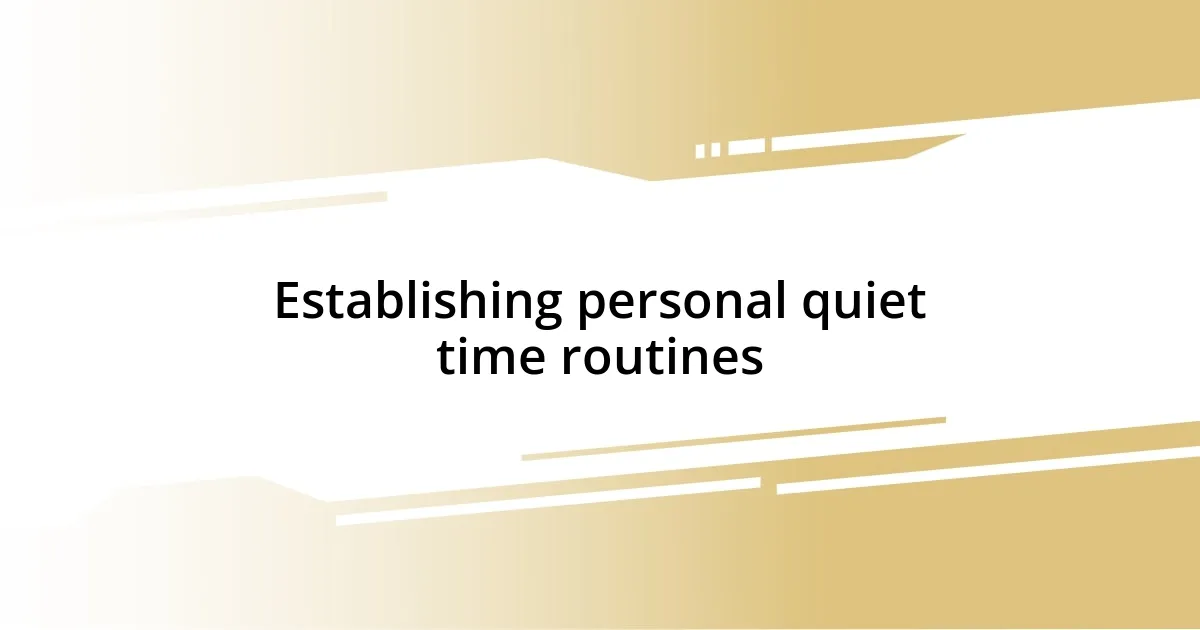
Establishing personal quiet time routines
Establishing personal quiet time routines has become a cornerstone of my day. Each morning, I carve out at least 20 minutes to sit in silence, sipping my coffee and letting the world outside blur into the background. It’s my little oasis, and I can’t express how revitalizing those moments are for my mind.
Interestingly, I’ve discovered that setting specific times for quiet throughout my day helps cultivate a sense of peace. I often find myself scheduling an afternoon break—just me, a cozy chair, and a book. What I’ve realized is that escaping into this personal bubble, even if just for a short while, allows my mind to reset and dive back into tasks with a clearer focus. Have you ever tried creating a sacred time for your thoughts?
Adopting these routines has truly transformed my approach to noise. I’ve even experimented with guided meditations, where the gentle voice leading you through reflections can drown out the chaos around. I remember one particular session when I felt a wave of calm wash over me, carrying away the tension I didn’t even know I was holding. It’s amazing how simply dedicating time to inner peace can significantly reduce the impact of external noise.












